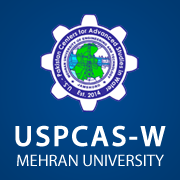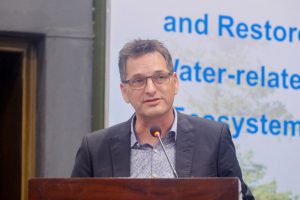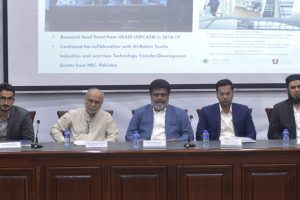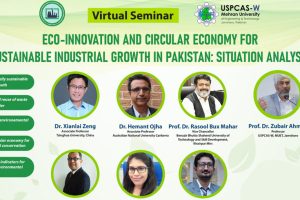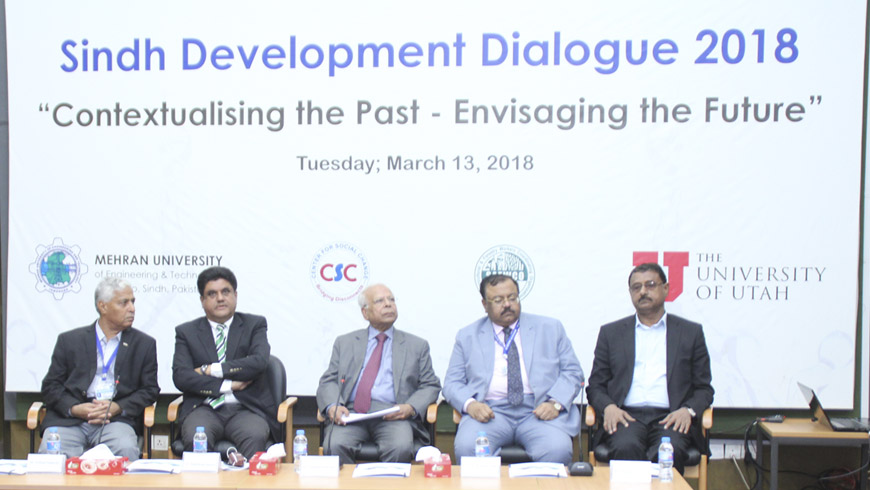
Sindh Development Dialogue 2018: Contextualizing the Past – Envisaging the Future
Sindh Development Dialogue (SSD)2018 on “Contextualizing the Past – Envisaging the Future” organized by the Center in collaboration with Center for Social Change (CSC) and Sindh Agricultural Forestry Workers and Coordinating Organization (SAFWCO) held at USPCASW Auditorium on March 13, 2018.The keynote speakers were Dr. Ishrat Hussain, the former Governor to State Bank of Pakistan, Dr. Kaiser, Bengali, eminent economist, Dr. Mohammad Aslam Uqaili, Vice Chancellor MUET, Dr. Rajab Ali Memon, Former Vice Chancellor Sindh Agriculture University, Mr. Abrar Kazi, water expert, Mr. Shahab Usto, Analyst and Lawyer, Dr. Bakhshal Lashari, Project Director USPCASW, Mr. Zulfiqar Halepoto, Executive Director CSC and Water-Environmental Activist and Mr. Suleman G. Abro, Founder SAFWCO.The speakers at the dialogueunderscored the need for structural reforms in the province and establishment of at least two metropolitan centers that would compete with Karachi to have balanced development in Sindh.
Welcoming the participants, Dr. Mohammad Aslam Uqaili said that the universities are working beyond the traditional scope of academic and research activities. He noted that the academia has not only to impart the quality education but have to seek the sustainable solution to the problems of respective communities which used to be based on the applied research. He said that around 100 research study projects initiated by MUET Water Center are underway which ultimately benefit the community.
Dr. Ishrat Hussain delivering a keynote speech said that improving governance and institutional capability of the provincial and district governments are prerequisite for the development of Sindh. He said that institutional capacity should be backed by transparency, the rule of law and robust freedom of information mechanism. Dr. Hussain shared his six-pillar strategy for development, which consisted of devolving power to local governments, enhancing governance capacity of local government bodies, establishing a district level public service commission, uplifting rural females and increasing irrigation water productivity.He recommended that female education, employment, and entrepreneurship in rural areas should be subsidized.
Dr. Kaiser Bengali chaired the plenary session on Policy Options for Sindh in the dialogue. While talking on Constraints to Development of Sindh – Critical Review of Institutional Framework and Dynamics of Political Economy, he said that the process of development, in its holistic sense, can be kick-started in the way ripples are created in water if a pebble is thrown in a pond. He likened Sindh as Pakistan’s OPEC (Organization of Petroleum Exporting Countries) and said that with 90pc of coal deposits and 72pc of gas production, there was no reason that people of the province did not get education and health facilities or face unemployment. He advocated connectivity of roads to create two metropolitan centers near Hyderabad and Sukkur, which would compete with Karachi to ensure balanced development in Sindh.Defending improvement in water efficiency, he said that its use would have to be connected with modern farm practices. He opposed sugarcane cultivation in Sindh as it caused water-logging.He lauded Sindh government’s efforts on Thar Coal Project which he said would be producing 20,000MW of electricity without losing the foreign exchange.
Shahab Usto talked about water analysis reports compiled in the backdrop of his petition and formation of a judicial commission on water and sanitation in Sindh. Speaking at an open forum on water rights, laws and citizen’s movements and responsibilities, said that the commission collected 460 water samples from across Sindh and found 91pc water in Karachi and 87pc in Hyderabad unsafe for drinking. He urged the academia to lead the process of development through research.
Mr. Abrar Qazi speaking on water security of Sindh – national, regional and global connections and way forward, said that the soil of Sindh due its percolation, evaporation, and sandy, needs more water as compared to that of Punjab. He asked Punjab to reciprocate with Sindh over the sharing of river water to build trust and help agricultural economies of the two provinces to grow further. He suggested that the domestic sewage and saline water of Right Bank Outfall Drain (RBOD) and Left Bank Outfall Drain should (LBOD) be treated and used for irrigation. Mr. ZuliqarHalepoto said that development ideology ought to switch from being ‘security-centric’ to ‘people-centric.’
Dr. Rajab Ali Memon delivered a talk on Connecting Development with Land and People, Dr. BakhshalLashari and Dr. Fateh Marri moderated the Question-Answer session while Mr. Suleman G. Abro presented the vote of thanks at the end of the event.Around 200 participants belonged to the water sector, industries, planning and development, academia and students participated in the dialogue.

